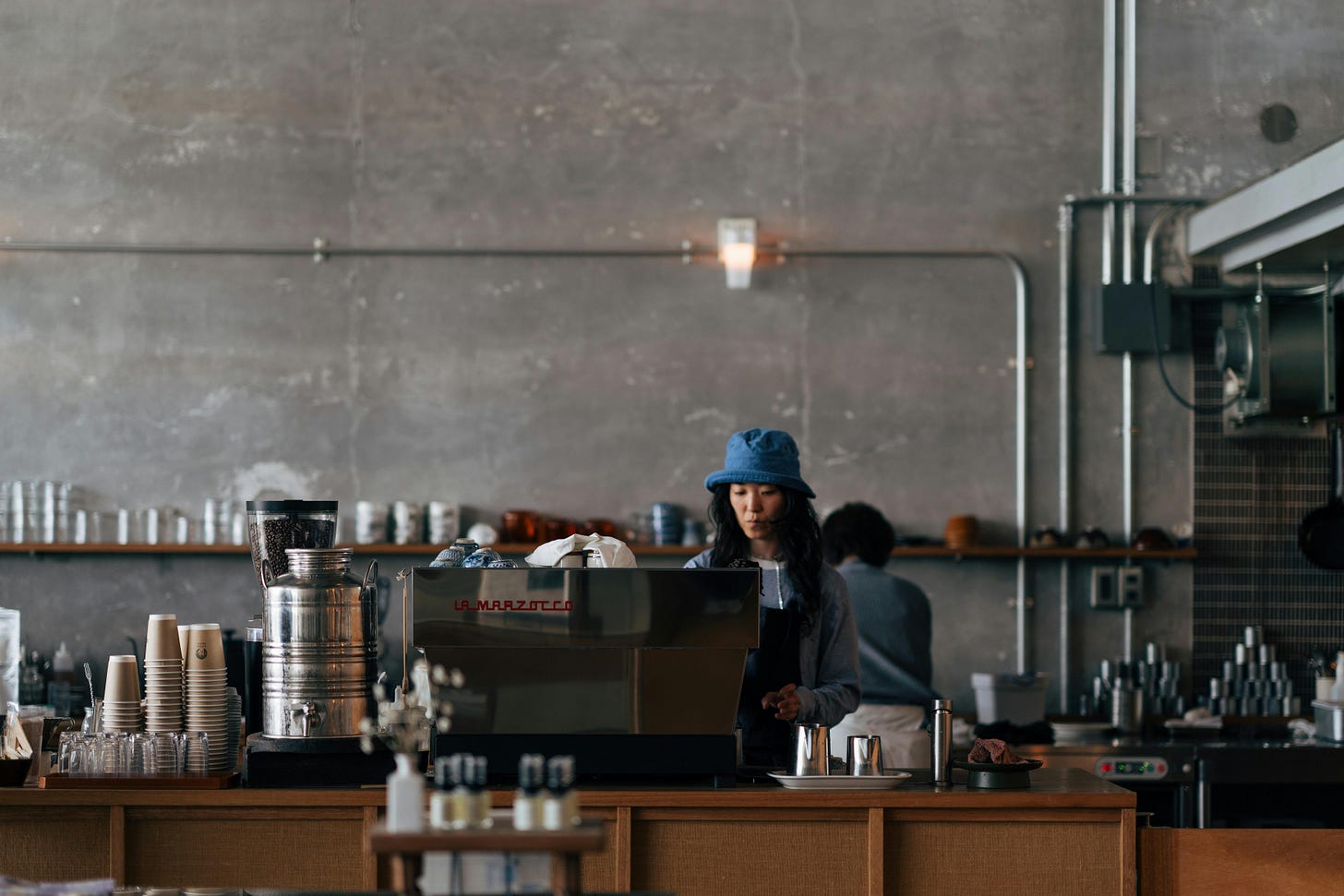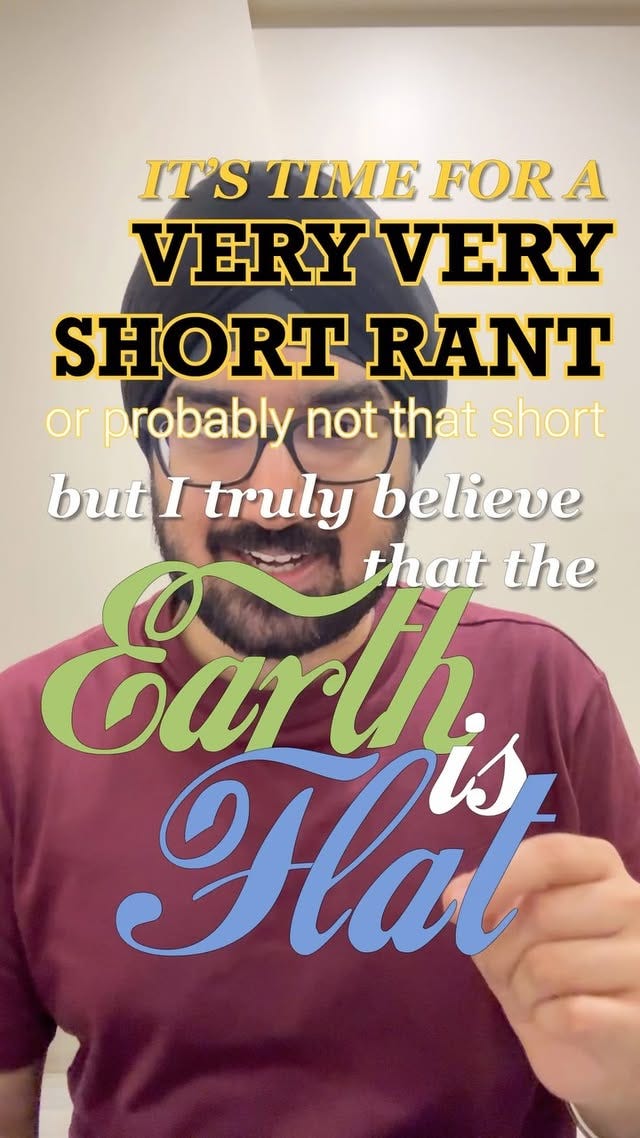How the World Became Flat: and why we feel numb 🌏
The algorithm didn’t just personalise us, it flattened us. Compressed culture into aesthetics. Turned discovery into confirmation.
Hi, Ravdeep here. 👋
Perfunktory is a newsletter that aims to break down trending subjects in the field of Music, Technology, Gaming and Culture as perfunctorily as possible. Keeping it perfunctory helps the discourse to be as candid as it can be.
Sign up below for free. 👇
You ever land in a new city and feel like you’ve already been there?
You step into a city, expecting wonder, maybe even a little disorientation. But instead, it feels like you’ve been here before. Not in the nostalgic, déjà vu kind of way, more like déjà scroll. The café has the same matte black interior, the same lo-fi beats playing in the background, the same pastel-toned menu with overpriced iced oat lattes or matcha lattes and the same “breathe” sign in cursive glowing above a potted plant. It’s beautiful, sure, but you’ve already seen it. On Instagram. In Berlin. In Bangkok. In Bandra.
But this déjà vu is not your intuition whispering. That’s the algorithm humming.
We’re not moving through the world to feel something new. We’re just chasing the comfort of recognition. The algorithm has done such a good job of feeding us what we like that we’ve stopped looking for what we don’t yet know we love. Everything is curated for the feed before it’s lived in real life. We don’t discover places anymore. We collect them like props for the moodboard we’ve been building in our heads. Places designed to photograph well but say very little once you’re actually in them.
That’s not just déjà vu. That’s algorithmic déjà vu.
The world has become flat. Not physically, but culturally.
We used to travel to get lost. To be surprised by the unknown. To discover new smells and fragrances, accents, faces, ways of being and living. I still remember the first time I went to Rome and bought a map because I was a student at the time and we didn’t have Google Maps. I was just walking down one street after another, taking in all the sights and sounds. And at the end of one of those streets, the Colosseum emerged. I still can’t get that image out of my head, even now. A top-tier human experience. I’m sure it can’t be replicated.
This isn’t a glitch in the matrix. It’s the matrix working exactly as intended.
Before we get into the essay, I want to give a shoutout to the reel that helped me put this feeling into words. It is a reel by Kareem Rahma titled “Episode 318: The Earth became flat… Feat @maryamdesarre” which can be found here.
What used to be unfamiliar has been replaced by familiarity dressed up in new geography. You go to Tokyo and end up in a Brooklyn-inspired café. You land in Istanbul and order the same truffle fries from a terrazzo plate. You check into a “local gem” in Mexico City, only to find it’s been designed to match Airbnb’s global aesthetic guide: pastel walls, macrame wall hangings, maybe a dusty copy of The Alchemist on the coffee table. It’s not wrong. It’s just eerily predictable.
🌍 What do we mean by “flat”?
The Earth is no longer round in a cultural sense. It’s flat. And what we’ve lost isn’t just originality. We’ve lost depth.
This isn’t a rant about preserving culture in amber or about gatekeeping. It’s about how our collective taste has been trained to chase familiarity. We used to travel to be overwhelmed. To see colours we hadn’t seen. To taste things we didn’t recognise. To stumble into the unknown and feel the edges of our smallness. There was beauty in discomfort. Humility in unfamiliarity.
The algorithm is built to reward what works. Its job is to keep us comfortable. To feed us versions of things we already know we like. When performance becomes the metric, what is left of culture is just an echo. We’re not seeing new things, we’re seeing familiar things wearing new masks, and we’re just confirming them.
Even our curiosity has been algorithmically approved. Spotify doesn’t show you what you need to hear, it plays what it knows you’ll tolerate. Netflix queues content that keeps you watching, not thinking. Instagram travel reels have become interchangeable. It’s the same drone shots. Sunset silhouettes. Linen shirts. Aperol Spritz in hand. It all blends into one long, tastefully looped illusion of discovery.
But that’s the trick. We’re not discovering, we’re confirming.
When every café is designed to be “found,” nothing truly is. When every restaurant is built to go viral, the food becomes secondary. We’re not building places anymore. We’re building sets. Temporary installations for content, not communities.
But this didn’t happen because someone planned it. No one declared war on spontaneity. No executive made a pitch deck on how to strip the world of texture. We just kept liking the same kind of content. We asked “Where is this?” enough times that the world decided to build the answer everywhere. The algorithm didn’t invent sameness, it just scaled what we asked for.
Now we’re living inside that reflection.
The result is a culture loop. Cities start to feel like echoes. Cafés like remixes. Every playlist, every pop-up, every “hidden gem” has been optimised for discoverability before experience. We’re not stumbling into anything anymore. We’re being guided. Gently. Expertly. Into experiences that have been pre-approved by strangers who got there first. It’s not exploration, it’s affirmation.
And that’s the strange part. You feel overstimulated but underwhelmed. You’ve seen so much, but very little of it has stayed with you. Because it’s not that the world has become boring. It’s that we’re being shown the same parts of it again and again. Wrapped in slightly different filters. Even your own taste begins to feel algorithmically engineered. You start to question whether you liked something because it moved you, or because it matched the vibe you’ve been trained to find meaningful.
We want to be moved, but everything we consume is built to keep us comfortable.
But the world didn’t stop being weird. We just stopped giving ourselves permission to find it.
The weird part is, I’ve felt it in myself too. A few months ago, I was on a trip with people I liked in a city I’d never been to, and I still felt numb. Everything looked right, the itinerary was perfect. But something inside me kept saying, “You’ve already done this. You’ve already been here.” I couldn’t figure out if it was exhaustion, or overstimulation, or just a kind of existential boredom. But I came back feeling like I hadn’t travelled at all and that scared me more than I expected.
There are still places that don’t care how they look on camera. Still restaurants that don’t exist online. Still streets that aren’t pinned on Google Maps. There are people building things without aesthetic strategy or viral potential. Places where the Wi-Fi is bad. The lighting is worse. But the experience? Unforgettable.
Maybe it’s not about escaping the algorithm. Maybe it’s about refusing to let it become the map. Go somewhere you haven’t saved. Say yes to a plan that doesn’t have a location tag. Order something you can’t pronounce. Miss the perfect shot. Drink bad coffee. Be confused. Be bored. Be surprised. Be the only person who remembers it happened.
Not for irony. Not for content. Just because it’s yours.
Get lost. Miss a trend. Let a moment be private. Stay offline a little longer than you’re used to. Choose the thing that makes no sense until it does.
The world feels flat because we stopped letting ourselves fall in love with its edges. But it’s still round in all the ways that matter. It’s just that most people aren’t looking anymore.
I also spoke about this in a recent video. You can watch it here or find it below. Would love to know what you think. Just reply to this email, or better yet, tell me the last time you found something truly unexpected.





